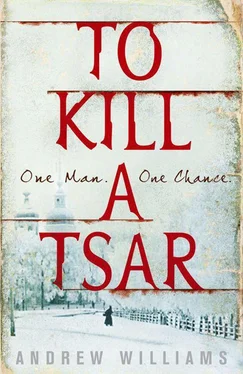‘Do you recognise this one?’ he asked, pointing to the red enamel decoration at his throat.
‘The Order of St Vladimir.’
‘I call it my Mikhailov medal,’ Barclay said with a broad grin. ‘I have you to thank for it.’ Then, turning to the door, he shouted: ‘Sergeant, I’ve finished with him.’
And again to Mikhailov: ‘Oh, I forget to mention. A comrade of yours is here too. Nikolai Kletochnikov.’
‘I’ve never heard of the fellow.’
‘What was it you called him, “your Director”? He hadn’t heard from you for a while so he paid you a visit. He was at a loss without you. Resentful that you’d kept him from the rest of the party. Of course, he didn’t know we’d picked you up already. A couple of his Moscow comrades were waiting for him — they were a little rough. He’s been very helpful.’
‘I don’t know what you’re talking about.’
‘No? Well, if you change your mind — and you might — speak to your guards.’
Mikhailov could hear their heavy tread on the polished boards behind him, and a moment later the warder of the ravelin was at his side with handcuffs.
‘Is the prisoner moving, sir?’ he asked.
‘Yes. To the Secret House. A chance for a little more reflection,’ replied Barclay.
It was the final test for enemies of the state, a damp unheated solitary block below the level of the river, where prisoners were left to rot in medieval darkness.
Mikhailov gazed at him with unflinching contempt. ‘You must know the tsar will die.’ His voice was cool, matter-of-fact, full of certainty. ‘It must be. It is the will of the people.’
Alexander II must die… the near future will show whether it is for me or another to strike the final blow. But he will die and with him we shall die, his enemies and executioners… fate has allotted me an early death. I shall not see one day, not one hour of our triumph. But I believe that by my death I am doing all that I have in my power to do…
Farewell letter of Ignatei Grinevitski, member of The People’s Will, 1 March 1881
Polite society celebrated Christmas as it always did in St Petersburg, with extravagant piety and glittering pomp. A score of expensively embossed invitations on Hadfield’s mantelpiece presented a daily challenge to the maid. In the bright gilded rooms of the rich, the season was much as it had been the previous year and for many more before. And yet there was something subtly different too, like a reflection in a mirror warped just a little by age, an uncomfortable distortion of the settled order. The authorities were demonstrating unusual efficiency. Hundreds of arrests, executions pour encourager , and it was almost a year since the explosion at the palace had rocked the foundations of the empire. Expensive drawing-room opinion on the English Embankment was that this was so much to the good but, like the frozen Neva they could see from their windows, a troubling and irreversible current was flowing beneath the surface. And there was a general reluctance to talk of the future, even at gatherings where serious conversation was not deemed to be a breach of good manners.
Hadfield noticed another, more particular change in the embankment’s opinion. Some of those who had been solicitous and most anxious to be his friend were beginning to avoid him. And while there were the invitations from the usual people — Baron Stieglitz, Count Shuvalov, the Baird and Gascoigne families — he was aware of a new stiffness in their smiles. At first he wondered if this was to do with his uncle’s fall from grace. Villagers were close to starvation in many parts of the south and the government was without the means to alleviate their suffering. Blame was falling squarely on General Glen’s shoulders as the controller of the empire’s finances. But if Hadfield was tarnished a little by this association, it was nothing to the stain caused by the rumour of his ‘unfortunate’ affair. Snatches of conversation, an oblique warning from Dobson, and his cousin Alexandra’s angry inarticulate tears one evening left him in little doubt that his private life was a matter of public speculation. Von Plehve or Dobrshinsky or someone acting under their orders must have set tongues wagging with a cleverly indiscreet remark. A hostess might welcome a handsome radical doctor into her drawing room to prove her liberal mind, but there was no social advantage to be won from someone who had conducted a relationship with a terrorist, a married woman to boot. The embankment felt aggrieved when it recalled the sympathy it had lavished upon him. So, although there were invitations still — he was a member of the Glen family, after all — no tears were shed when he made his excuses.
Hadfield was surprised by how little it bothered him. He had always felt himself to be an outsider, revelled in his secret difference, and yet he had enjoyed the privileges of family and his connections too. But when Anna had returned to him he had accepted her without hesitation. He did not share her faith in The People’s Will, he rejected the morality and efficacy of terror, but he no longer felt comfortable with the easy assumptions of most of his class, nodding at balls and parties and dinners when the privileged spoke of the futility of hoping for democracy in Russia.
He saw very little of Anna at Christmas — a few snatched hours — and he spent the last day of the old year with his family. The first day of the new one arrived with champagne and dancing, the rustle of silk, gay uniforms whirling across a polished floor, familiar, happy faces. But Hadfield felt only the dull ache of separation. Later at home he sat with his journal on his knee and tried to write of his hopes, but mostly of his fears for the coming year, his sense of life on the cusp. But his befuddled mind could not conjure the words necessary to bring order to his feelings. He was still awake after une nuit blanche as the church bells rang out across the city the following morning.
In the first weeks of January Hadfield realised he was being followed once again. Tall — a little too tall to pass entirely unnoticed by someone on his guard — early thirties, neatly trimmed brown beard, plainly but well dressed, his shadow moved on a crowded street with the ease of one trained to the task. And there were others at night and skulking outside his home in the morning. His shadow was with him when he visited the British embassy to treat one of the secretaries who had wrenched his knee. The ambassador’s wife no longer included Hadfield’s name on her guest list for dinner. Fortunately, his professional judgement was still valued and he remained the embassy doctor in all but name. Lord Dufferin’s secretary — an Anglo-Irishman called Kennedy — had fallen badly on the frozen Neva and his friends had been obliged to carry him back to the embassy on a hand cart.
Hadfield found him with a large glass of brandy in the ambassador’s outer office. It was soon apparent from his ill-tempered muttering that his pride had taken as sharp a knock as his knee.
‘Some cheeky wee buggers pelted me with snow while I was lying there helpless on the cart,’ he explained in surprisingly broad Ulster Scots.
Hadfield gave him a mild analgesic and instructed him to rest for a few days.
‘By the way, Doctor, Colonel Gonne was hoping you would spare some time to see him before you leave,’ Kennedy informed him.
‘A professional matter?’
Kennedy did not know.
The military attaché’s rooms were in the gloomy west wing of the embassy but with a fine and fitting view over the Field of Mars. Hadfield had met the colonel for the first time at his uncle’s house and twice more since, and he had formed the impression of a steely and ambitious character. A handsome man in his late forties, with red hair and whiskers, there was a glint in his eye that suggested he might be quick to take offence. ‘Thank you for finding the time to see me, Doctor,’ he said, indicating Hadfield should take the chair in front of his desk. ‘I’ll come straight to the point. Lord Dufferin has asked me to raise a delicate matter with you.’
Читать дальше












